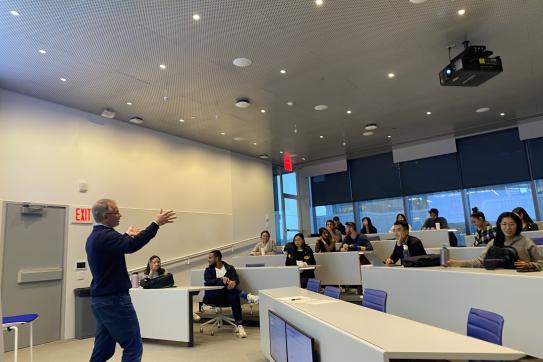If MBA students don’t aspire to lead their own companies as CEO, they might have their sights on becoming a product manager, a position Ben Horowitz called “CEO of the product” in his 1998 essay, “Good Product Manager/Bad Product Manager.”
“A good product manager takes full responsibility for the product,” according to Horowitz, a 1988 computer science alumnus of Columbia University, co-founder of venture capital firm Andreessen Horowitz, and co-founder and CEO of software company Opsware (formerly LoudCloud), acquired in 2007 by Hewlett Packard.
Since then, the role has only grown. According to a 2019 Agile Insider article, “Surprising Stats on the Demand for Product Manager Roles in the US,” between August 2017 and June 2019, product management roles rose 32 percent. It also noted that consistent changes in how companies do business were pushing this growth. Those changes included “strong growth in e-commerce and continued digital transformation of traditional brick and mortar retailers; an increase in financial sector roles led by banks and credit card companies, with a push for new digital-first financial instruments; and moves toward developing product practices by top services firms in the management consulting and financial advisory space.”
High interest in product management also helps drive Columbia Business School’s new Product Management Program, launched in fall 2022 to help “change the hiring dynamics” for in-demand product managers, according to Chris LaSala, a lecturer in marketing at CBS, who developed the course.
In partnership with businesses, students work alongside company executives to develop new consumer tech products from ideation through commercialization. LaSala’s strategy is to provide them the opportunity to apply the best practices and frameworks they’ve learned in the classroom to various real-world issues, such as changes in consumer behavior and new regulatory requirements.
For the fall 2022 PM Lab, he recruited Hulu, Snap, Stripe, Theorem, Bees AB/inBev, Licorice, PTC, and ZipRecruiter. And LaSala wants to keep attracting top companies, including Columbia alumni business owners who want to tap into CBS student intellectual capital.
It's What You Teach and How You Teach It
“Product management needs to be taught in a way where it’s internalized,” says LaSala, a former global product lead at Google. “I’m trying to bring it to life. The lab creates the perfect environment in which students learn to deal with ambiguity, manage imperfect information, communicate with busy executives, and work under time pressures while balancing other priorities — just like a real PM.”
According to Jonah Rockoff, CBS senior vice dean of curriculum and programs and the Armand G. Erpf Professor of Business, this is the kind of experience that he and other curriculum planners look for in experiential learning opportunities for students. “It’s one thing to talk about something in the classroom and to present people with cases. But it’s quite another to give them opportunities to get their hands dirty and really collaborate with an external partner who has a real problem that needs solving in real time.”
LaSala says additional courses in the CBS catalog can reinforce what students will learn through hands-on experience in the Product Management Program. “You choose your own adventure,” he says, referring to the multiple options students have to dive deeper into product management skills, combining the PM Program with courses like Think Bigger, Business Analytics, or Python for MBAs.
Preparing for the Digital World
While product management has been part of business practice for a long time, LaSala says, “when I think product management or digital product management, I think broadly in the context of any company that leverages the underlying internet infrastructure as a means of doing business in some way, shape, or form.”
He notes that his former employer, Google, is conspicuously a technology company, but financial service companies and banks also fit the description. “You wouldn’t consider Bank of America to be a tech company, but all of its engagement in products with customers happens online through tech.” So banks and credit card companies have product managers doing digital work. “Someone has to design the Bank of America app. That’s a product,” says LaSala.
LaSala is heading into the next session of the course and lab on a high note, with positive enrollment and student feedback. The lab course for spring 2023 has reached full enrollment with nine on a waiting list, and 20 people have enrolled in an Executive MBA section.
In a survey question about the course’s overall value, 93.55 percent of the 29 out of 31 students who responded said they agreed or strongly agreed that overall the course was valuable to them.
Many students said they appreciated the opportunity to work directly with top companies on their tech product issues, commenting:
- “Having the opportunity in this class to work with real clients to identify tangible solutions was the exposure I needed to truly understand what being a PM entails.”
- “I love [LaSala’s] no-nonsense approach. He really expects us to deliver the quality of work that we’d deliver while actually working for a company.”
- “This course was very practical, and helped me apply my previous product management experience to a real project and company.”
